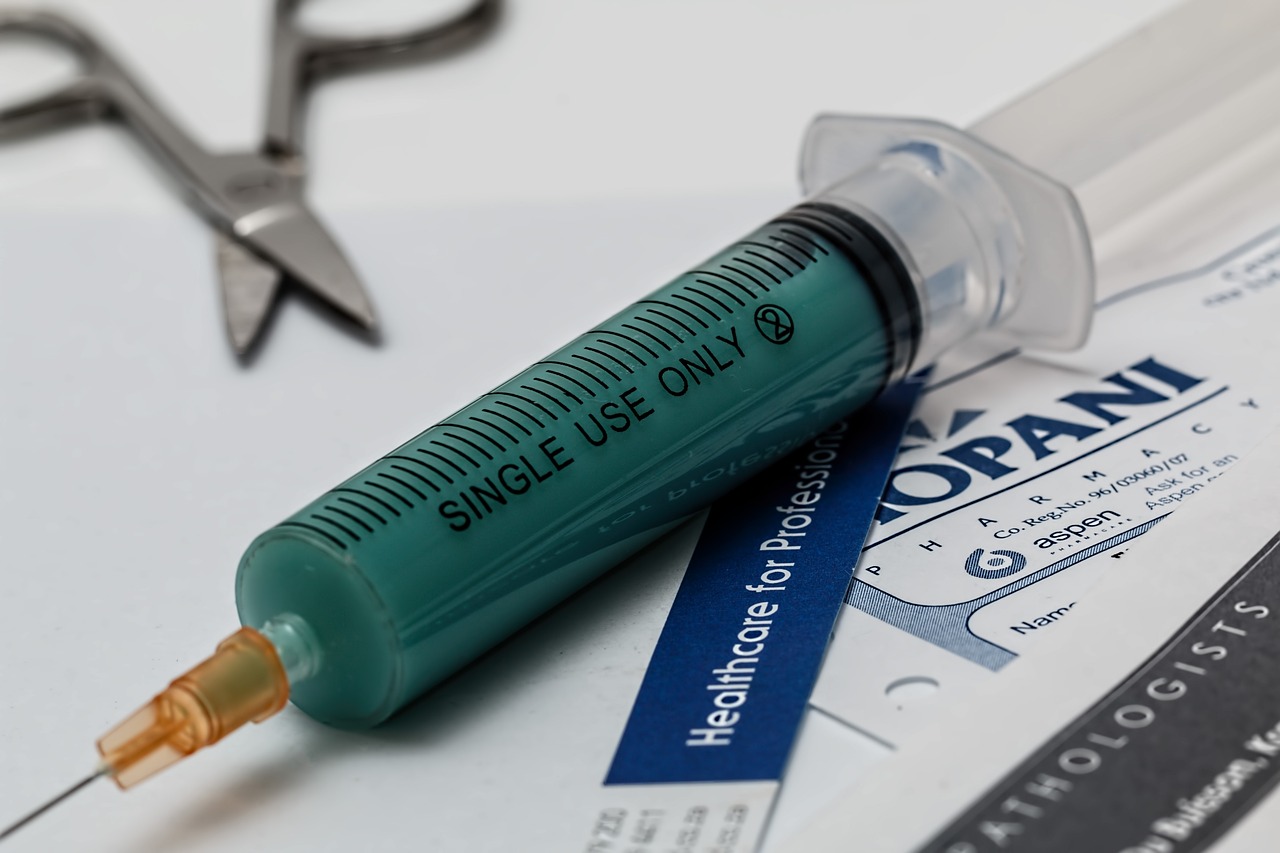Protecting Your Safety During Immunizations
Immunizations are one of the most effective ways to protect not just individual health but also the well-being of the community at large. However, the thought of getting vaccinated can often stir up feelings of anxiety and uncertainty. That's why it's crucial to focus on . This article will explore essential strategies and considerations that can help you feel more prepared and informed as you approach the immunization process.
When we talk about immunization safety, we're diving into a topic that is incredibly significant for public health. Vaccines play a vital role in preventing diseases that can be harmful or even deadly. They work by stimulating the immune system to recognize and fight off pathogens without causing the disease itself. The rigorous processes that vaccines undergo before they reach the public—like clinical trials and ongoing monitoring—are designed to ensure their efficacy and safety. This means that by the time you receive a vaccine, it has already been scrutinized by scientists and health professionals alike. Understanding this can help alleviate some of the fears surrounding immunizations.
Preparation is key to a safe immunization experience. Before your appointment, it’s important to review your medical history and be aware of any allergies or previous reactions to vaccines. This knowledge can help healthcare providers tailor their approach to your needs. Don't hesitate to ask questions such as:
- What vaccine am I receiving today?
- What are the potential side effects?
- How should I care for myself after the vaccine?
Being proactive about your health can make a world of difference. It’s like preparing for a big exam; the more you know, the less anxious you’ll feel. Having all the necessary information can empower you and ensure that you have a smooth experience.
While vaccines are generally safe, it’s essential to know what to expect. Common side effects can include soreness at the injection site, mild fever, or fatigue. These reactions are usually temporary and indicate that your body is building protection. However, if you experience severe symptoms or anything that feels out of the ordinary, don’t hesitate to seek medical advice. It’s always better to err on the side of caution.
After receiving a vaccine, proper care is essential to ensure your comfort and well-being. Here are some tips for managing any discomfort:
- Apply a cool compress to the injection site to reduce swelling.
- Stay hydrated and rest if you feel fatigued.
- Monitor for any unusual symptoms and keep a record of how you feel.
Recognizing signs of adverse reactions is just as important. If you notice anything concerning, such as difficulty breathing or a rash, it’s crucial to seek immediate medical attention. Remember, your health is paramount.
Immunizations are often surrounded by myths that can cloud judgment. For instance, some people believe that vaccines cause the diseases they aim to prevent. This is not true; vaccines are designed to help your body build immunity without causing illness. Addressing these misconceptions is vital for enhancing public understanding of vaccine safety. Relying on scientific evidence can help dispel fears and encourage more people to get vaccinated.
Having a support system can significantly ease anxiety related to immunizations. Whether it’s a family member, a friend, or even a healthcare provider, having someone by your side can provide comfort and reassurance. Think of it like having a safety net; knowing that someone is there to support you can make the experience feel less daunting.
Understanding the legal and ethical frameworks surrounding immunizations is crucial. Informed consent is a fundamental principle, meaning that patients have the right to understand what they are consenting to before receiving a vaccine. This includes being aware of potential risks and benefits. Knowing your rights can empower you to make informed choices about your health.
As medical science advances, so do safety protocols. Emerging trends and technologies aim to enhance the safety and efficacy of immunizations. For instance, research into mRNA technology has revolutionized vaccine development, making it faster and more efficient. Keeping an eye on these trends can help you stay informed about the best practices in immunization safety.
Q: Are vaccines safe for everyone?
A: While most people can safely receive vaccines, certain individuals may have specific contraindications. It's always best to consult with your healthcare provider.
Q: What should I do if I feel unwell after a vaccine?
A: Mild side effects are common, but if you experience severe symptoms or anything unusual, seek medical advice immediately.
Q: How can I support someone who is anxious about getting vaccinated?
A: Offer to accompany them to their appointment and provide reassurance about the benefits of vaccination.

Understanding Immunization Safety
Immunization safety is a critical aspect of public health that cannot be overstated. Vaccines play a pivotal role in preventing infectious diseases, protecting not just the individual receiving the vaccine but also the wider community through herd immunity. When we talk about immunization safety, we're not just referring to the vaccine itself but also to the entire process that ensures its efficacy and safety. This includes stringent testing protocols, monitoring adverse reactions, and maintaining transparent communication between healthcare providers and patients.
Before a vaccine is approved for public use, it undergoes a rigorous evaluation process. This includes multiple phases of clinical trials where thousands of participants are monitored for safety and effectiveness. Only after extensive research and analysis can a vaccine be deemed safe for widespread distribution. The role of regulatory bodies, such as the FDA in the United States, is crucial in this process. They ensure that vaccines meet the highest safety standards before they reach your arm.
Moreover, understanding the potential risks and benefits of vaccines is essential. While the likelihood of severe side effects is minimal, being aware of them can help individuals make informed choices. For instance, common mild reactions include soreness at the injection site, a low-grade fever, or fatigue. These are typically short-lived and are signs that the body is building protection against the disease. However, serious side effects, although rare, can occur, which is why monitoring after vaccination is vital.
To further enhance immunization safety, healthcare providers engage in a thorough review of a patient's medical history before administering vaccines. This includes checking for any allergies, previous adverse reactions to vaccines, and current health conditions that may affect the immunization process. Patients are encouraged to ask questions and express any concerns they may have. This open dialogue fosters trust and ensures that individuals feel comfortable and informed about their immunization choices.
In summary, understanding immunization safety involves recognizing the rigorous processes behind vaccine development, the importance of informed consent, and the role of healthcare providers in safeguarding patient health. The more informed you are, the better you can protect yourself and contribute to the health of your community. Remember, vaccines are not just a personal choice; they are a public health necessity. By getting vaccinated, you are playing your part in a larger fight against preventable diseases.
- What are the most common side effects of vaccines? Common side effects include soreness at the injection site, mild fever, and fatigue.
- How are vaccines tested for safety? Vaccines undergo multiple phases of clinical trials and must be approved by regulatory bodies before public use.
- Can I get vaccinated if I have a chronic illness? It’s essential to discuss your medical history with your healthcare provider to determine the best course of action.
- What should I do if I experience a severe reaction? Seek medical attention immediately and report the reaction to your healthcare provider.

Preparing for Your Immunization
Preparation is key to a safe immunization experience, and it can make a world of difference in how you feel during and after your appointment. Think of it as getting ready for a big game; the more you prepare, the better your performance will be. First and foremost, it's essential to review your medical history. This includes any previous vaccinations you've had, allergies, or past reactions to vaccines. By being aware of your health background, you can provide your healthcare provider with crucial information that can guide their recommendations.
Before your appointment, don’t hesitate to jot down any questions you might have. This could range from inquiries about the specific vaccine you’re receiving to concerns about side effects. Here are some questions you might consider asking:
- What vaccine am I receiving today?
- What are the common side effects?
- Are there any specific precautions I should take after receiving the vaccine?
Additionally, it's a good idea to prepare yourself mentally. Immunization can be anxiety-inducing for many, but remember that the benefits of vaccination far outweigh the temporary discomfort. Consider bringing along a friend or family member for support; their presence can provide comfort and reassurance. You might even want to bring along some entertainment—like a book or music—to help distract yourself while you wait.
Another critical aspect of preparation is ensuring you are in good health on the day of your appointment. If you are feeling under the weather, it’s wise to consult your healthcare provider to determine whether you should proceed with the immunization. They can guide you on the best course of action, ensuring that you remain safe and healthy.
Lastly, don't forget to check if you need to take any specific actions before your appointment, such as fasting or avoiding certain medications. Being well-informed and prepared can transform your immunization experience from a stressful event into a smooth and straightforward process.
Q: What should I bring to my immunization appointment?
A: It's essential to bring your vaccination card, a form of identification, and any relevant medical records. If you have questions, jot them down to ensure you don’t forget to ask.
Q: Can I eat before my immunization?
A: Generally, you can eat before your appointment unless advised otherwise by your healthcare provider. Staying hydrated is also a good idea.
Q: What if I feel anxious about getting vaccinated?
A: It's perfectly normal to feel anxious. Consider bringing someone you trust for support, and remember that the healthcare staff are there to help you feel comfortable.
Q: How long should I stay at the clinic after my shot?
A: Most clinics recommend staying for about 15 minutes post-vaccination to monitor for any immediate reactions.

Common Side Effects of Vaccines
When it comes to vaccines, it's essential to understand that while they are generally safe and effective, they can sometimes cause side effects. Think of it like a roller coaster ride; while the thrill is exhilarating, there may be a few bumps along the way. Most side effects are mild and temporary, serving as a sign that your body is building protection against the disease. So, what should you expect after getting vaccinated?
Common reactions can vary depending on the type of vaccine received, but many individuals report similar experiences. Here’s a quick rundown of the most frequently reported side effects:
- Pain or swelling at the injection site: This is the most common reaction, often resembling a bruise or soreness where the needle went in.
- Fatigue: Feeling a bit drained after your shot is normal, as your body is working hard to create immunity.
- Headache: Some people may experience mild headaches, which can usually be managed with over-the-counter pain relief.
- Fever: A low-grade fever is a common response, indicating that your immune system is kicking into gear.
- Muscle aches: Just like after a workout, you might feel some muscle soreness as your body reacts to the vaccine.
While these side effects can be uncomfortable, they typically resolve within a few days. It's important to remember that these reactions are a normal part of the immunization process, and they indicate that your immune system is responding appropriately. However, if you experience any severe or persistent symptoms, it’s crucial to consult with a healthcare professional.
In rare cases, individuals may experience more serious side effects, such as allergic reactions. These reactions can include difficulty breathing, swelling of the face or throat, and a rapid heartbeat. If you notice any of these symptoms, it’s vital to seek immediate medical attention.
To help you better understand the potential side effects, here’s a quick comparison table:
| Common Side Effect | Duration | When to Seek Help |
|---|---|---|
| Pain at injection site | 1-3 days | If it persists beyond a week |
| Fatigue | 1-2 days | If it interferes with daily activities |
| Headache | 1-2 days | If severe or persistent |
| Fever | 1-3 days | If it exceeds 102°F (39°C) |
| Muscle aches | 1-2 days | If it feels more severe than usual |
Understanding these side effects can help you manage your expectations and prepare for your vaccination. Just like any journey, knowing what to expect can make the ride smoother. If you have any concerns or questions about the side effects of vaccines, don’t hesitate to reach out to your healthcare provider. They are there to guide you and ensure your vaccination experience is as safe and comfortable as possible.
Q: Are side effects a sign that the vaccine is working?
A: Yes, mild side effects often indicate that your immune system is responding to the vaccine and building protection.
Q: How long do side effects last?
A: Most side effects resolve within a few days, but if they persist or worsen, it’s advisable to consult a healthcare professional.
Q: Can I take pain relievers after vaccination?
A: Yes, over-the-counter pain relievers can help manage discomfort, but it’s best to consult your doctor for personalized advice.
Q: What should I do if I experience severe side effects?
A: Seek immediate medical attention if you notice symptoms like difficulty breathing or swelling of the face or throat.

Post-Immunization Care
After receiving your vaccine, the journey doesn’t just end there; in fact, it’s just the beginning of an important phase known as . This period is crucial for ensuring that your body adjusts well to the vaccine and that any potential side effects are managed effectively. Think of it as a gentle wrap-up to a journey that started with preparation and anticipation. Just like you wouldn't hop off a roller coaster without taking a moment to catch your breath, it's essential to take a moment to care for yourself after immunization.
First and foremost, it’s important to monitor your body for any reactions. While many people experience little to no side effects, some might notice mild discomfort. Common reactions include soreness at the injection site, mild fever, or fatigue. These effects are generally short-lived and a sign that your immune system is doing its job. However, knowing when to seek help is key. If you experience anything beyond mild symptoms, such as a high fever or prolonged discomfort, don’t hesitate to contact your healthcare provider. They’re there to help you navigate any bumps along the way.
To further enhance your recovery experience, consider these post-immunization care tips:
- Stay Hydrated: Drink plenty of fluids to help your body recover and flush out any toxins.
- Rest: Allow your body to recuperate; a bit of extra sleep can work wonders.
- Manage Discomfort: Over-the-counter pain relievers, like acetaminophen or ibuprofen, can help alleviate soreness or fever, but always consult with your healthcare provider first.
Creating a comfortable environment at home can also make a big difference. Cozy up with your favorite blanket, binge-watch a series, or dive into a good book. This can be a great way to distract yourself from any minor discomfort and allow your body to focus on building immunity. Remember, the goal is to create a supportive atmosphere where you can relax and heal.
In addition to physical care, it’s equally important to keep an eye on your emotional well-being. Vaccination can sometimes stir up anxiety or fear, especially for those who may have had a negative experience in the past. Don’t hesitate to talk about your feelings with friends or family. Sharing your thoughts can lighten the emotional load and provide reassurance. Consider scheduling a follow-up chat with your healthcare provider if you have lingering concerns; they can provide clarity and support.
Lastly, always keep your vaccination record handy. This document is not just a piece of paper; it’s your passport to a healthier future. It can help you track which vaccines you've received and when you might need boosters. Plus, it’s often required for school, travel, or certain jobs. Treat it with care, just like you would a cherished photo or a valuable ticket!
In conclusion, post-immunization care is not just about managing side effects; it’s about nurturing your body and mind as they embark on the journey of building immunity. By following these guidelines, you can ensure a smooth transition into this new phase of health. Remember, you’re not alone in this; your healthcare team is just a call away, ready to support you every step of the way.
Q: What should I do if I experience a severe allergic reaction after my vaccination?
A: If you notice symptoms like difficulty breathing, swelling of the face or throat, or a rapid heartbeat, seek emergency medical help immediately. These can be signs of anaphylaxis, a rare but serious reaction.
Q: How long should I rest after getting vaccinated?
A: It’s generally recommended to take it easy for the rest of the day after your vaccination. Listen to your body; if you feel tired or unwell, give yourself permission to rest as needed.
Q: Can I exercise after getting vaccinated?
A: Light exercise is usually fine, but it’s best to avoid intense workouts for at least 24 hours post-vaccination. Pay attention to how your body feels and adjust accordingly.
Q: When should I contact my healthcare provider after vaccination?
A: If you experience any unexpected or severe symptoms that concern you, or if common side effects persist longer than a few days, don’t hesitate to reach out for advice.

Myths and Misconceptions
When it comes to immunizations, there are a plethora of myths and misconceptions that can cloud the judgment of even the most informed individuals. It's almost like a game of telephone, where the original message gets distorted as it passes from person to person. Many people have heard things like, "Vaccines cause autism," or "You can get the flu from the flu shot." But let's set the record straight. These myths not only create unnecessary fear but can also lead to hesitancy in receiving crucial vaccinations.
Firstly, it's essential to understand that vaccines are rigorously tested for safety and efficacy before they are approved for public use. The idea that vaccines can cause serious harm is often based on anecdotal evidence rather than scientific research. For instance, the claim linking vaccines to autism has been thoroughly debunked by numerous studies. The original paper that suggested this link has been retracted and discredited, yet the myth persists. This is why education and awareness are vital in combating misinformation.
Another common misconception is that vaccines weaken your immune system. In reality, vaccines work by training your immune system to recognize and fight off specific pathogens. Think of it like a dress rehearsal for your immune system. When you get vaccinated, your body learns how to respond to a virus or bacteria without actually getting sick. This preparation means that if you encounter the real disease, your immune system is ready to spring into action.
Many people also believe that vaccines are only necessary for children. However, adults need to keep their vaccinations up to date as well. Diseases like tetanus, pertussis, and even the seasonal flu can affect anyone, regardless of age. Regular booster shots and annual vaccinations are crucial for maintaining immunity. It's like keeping your car in good condition; regular maintenance is key to preventing breakdowns.
To further clarify some of these myths, let's look at a table that highlights common misconceptions alongside the facts:
| Myth | Fact |
|---|---|
| Vaccines cause autism | No scientific evidence supports this claim; it has been debunked by multiple studies. |
| You can get sick from vaccines | Vaccines contain inactivated or weakened germs that cannot cause disease. |
| Vaccines are only for kids | Adults also need vaccinations to maintain immunity against various diseases. |
| Natural immunity is better than vaccine-acquired immunity | Natural infection can lead to serious complications; vaccines provide a safer way to gain immunity. |
By dispelling these myths, we can foster a more informed community that understands the importance of immunizations. It's crucial to rely on scientific evidence and consult healthcare professionals when in doubt. Remember, staying informed is your best defense against misinformation.
Q: Are vaccines safe for everyone?
A: Most vaccines are safe for the general population, but it’s essential to consult your healthcare provider, especially if you have specific health conditions.
Q: How do I know if a vaccine is necessary for me?
A: Your healthcare provider can guide you based on your medical history, age, and lifestyle factors.
Q: What should I do if I experience side effects?
A: While most side effects are mild and temporary, if you experience severe reactions, contact your healthcare provider immediately.

Support Systems During Immunization
Getting vaccinated can be a nerve-wracking experience for many people, and that’s completely normal. Just like a roller coaster ride, the anticipation can be filled with excitement and a little fear. This is where having a support system comes into play. A friendly face or a comforting voice can make all the difference in easing anxiety and creating a positive atmosphere during the immunization process.
Imagine walking into a clinic, feeling a mix of apprehension and curiosity. Now, picture your best friend or a family member by your side, holding your hand and cracking jokes to lighten the mood. That’s the power of support! It’s not just about having someone there physically; it’s about emotional reassurance. A supportive companion can help you stay calm, remind you of the benefits of the vaccine, and distract you during the actual injection.
But what does a strong support system look like? It can vary from person to person. For some, it might be a parent or sibling who’s been through the process before. For others, it could be a close friend who knows how to make them laugh. Here are some ways support systems can help:
- Emotional Support: Just having someone to talk to can ease anxiety. They can provide encouragement and remind you why you’re getting vaccinated in the first place.
- Practical Assistance: A support person can help with logistics, such as scheduling appointments or arranging transportation to and from the clinic.
- Distraction Techniques: Engaging in conversation or listening to music can help take your mind off the impending shot.
Moreover, it’s important to communicate openly with your support system about your feelings and concerns regarding the immunization. They can help address any fears you might have and provide reassurance based on their own experiences. Sometimes, just knowing that someone else has felt the same way can be incredibly comforting.
In addition to friends and family, healthcare providers also play a critical role in your support system. They are there to answer any questions you might have and to ensure you understand the immunization process. Don’t hesitate to ask them about what to expect before, during, and after your appointment. Their expertise can provide you with the peace of mind you need.
Lastly, don’t underestimate the power of community support. Many local organizations and online forums provide valuable resources and information about vaccinations. Engaging with others who are going through similar experiences can help you feel less isolated and more empowered. Remember, you’re not alone in this journey!
So, whether it’s a friend, a family member, or a healthcare professional, having a solid support system during immunization can transform a potentially stressful experience into a more manageable and even positive one. After all, it’s not just about getting the shot; it’s about taking a step towards a healthier future with the support of those who care about you.
Q: Can I bring someone with me to my immunization appointment?
A: Yes! Bringing a friend or family member can provide comfort and support during the process.
Q: What should I talk about with my support person while waiting?
A: You can talk about anything that makes you feel relaxed, like favorite movies, upcoming plans, or even light-hearted jokes.
Q: What if my support person is also nervous about vaccinations?
A: It’s okay! You can support each other by sharing your feelings and encouraging one another to focus on the positive aspects of getting vaccinated.

Legal and Ethical Considerations
When it comes to immunizations, understanding the legal and ethical frameworks is crucial for both patients and healthcare providers. The process of vaccination is not just a medical procedure; it is intertwined with various laws and ethical standards that protect individuals' rights and ensure informed decision-making. One of the primary legal aspects involves the concept of informed consent. This means that before receiving a vaccine, individuals must be fully informed about the benefits, risks, and potential side effects of the vaccine. It's not just about signing a piece of paper; it’s about genuinely understanding what you are agreeing to.
Informed consent is particularly important because it empowers patients. Imagine you’re about to board a plane, and the airline doesn’t tell you anything about your flight. Would you feel comfortable? Probably not! Similarly, with vaccinations, patients deserve to know what’s happening to their bodies. This is where healthcare providers play a vital role. They should communicate clearly and answer any questions you might have. If you feel uncertain, asking questions is not just encouraged; it’s your right.
Moreover, ethical considerations go beyond just consent. They encompass the broader implications of vaccination on public health. Vaccines are designed not only to protect the individual but also to contribute to herd immunity, which is vital for safeguarding those who cannot be vaccinated due to medical reasons. Thus, the ethical responsibility of getting vaccinated extends to protecting the community. This brings us to the concept of vaccine hesitancy. Many individuals express concerns based on misinformation or personal beliefs. Addressing these hesitations ethically involves providing accurate information and fostering open dialogue without judgment.
Another significant aspect of legal and ethical considerations in immunization is the right to refuse vaccination. While it's essential to promote vaccination for public health, individuals have the right to make personal health decisions. However, this right can sometimes conflict with public health policies, especially in settings like schools or workplaces. For example, some institutions may require vaccinations for attendance or employment, raising questions about personal freedoms versus community safety. This balance is delicate and often debated among policymakers, healthcare professionals, and the public.
It's also important to consider the role of equity in immunization. Access to vaccines should be equitable, regardless of socioeconomic status, race, or geographical location. Legal frameworks often aim to ensure that vulnerable populations receive the same level of care and access to immunizations as others. This can involve government programs, community outreach, and education initiatives to ensure that everyone has the opportunity to protect themselves and their communities.
In summary, navigating the legal and ethical landscape of immunizations requires a multifaceted approach. It involves understanding informed consent, the ethical implications of vaccination for public health, the right to refuse, and ensuring equitable access to vaccines. By fostering a culture of informed decision-making and open communication, we can enhance the safety and efficacy of immunizations while respecting individual rights.
- What is informed consent in immunizations?
Informed consent means that patients must be fully informed about the vaccine's benefits, risks, and side effects before agreeing to receive it. - Can I refuse a vaccination?
Yes, individuals have the right to refuse vaccinations, but this may have implications for public health policies in certain settings. - How do legal frameworks ensure equitable access to vaccines?
Legal frameworks often include policies aimed at providing vaccines to vulnerable populations, ensuring everyone has access regardless of their background.

Future Trends in Immunization Safety
As we look to the future, the landscape of immunization safety is evolving at a rapid pace, driven by advancements in technology and a deeper understanding of immunology. One prominent trend is the development of mRNA vaccines, which have gained significant attention during the COVID-19 pandemic. These vaccines not only offer a new method of delivering immunity but also possess the potential for rapid adaptation to emerging pathogens. Imagine being able to tweak a vaccine like adjusting a recipe – this flexibility could revolutionize how we respond to outbreaks.
Another exciting trend is the integration of artificial intelligence (AI) in vaccine research and safety monitoring. AI algorithms can analyze vast amounts of data from clinical trials and real-world studies to identify potential side effects more quickly and accurately than traditional methods. This means that any adverse reactions can be addressed sooner, ensuring a safer experience for patients. Think of AI as a vigilant guardian, always on the lookout for any signs of trouble.
Moreover, the rise of personalized vaccines is on the horizon. Just as we have seen in other areas of medicine, tailoring vaccines to an individual's genetic makeup could enhance efficacy and minimize side effects. This approach would not only make immunizations safer but also more effective, as we move away from the one-size-fits-all model.
Additionally, digital health technologies are playing an increasingly important role in immunization safety. Mobile apps and wearable devices can help track vaccination schedules, remind patients of upcoming shots, and even monitor health status post-vaccination. This real-time data collection can provide healthcare providers with insights into vaccination outcomes, making it easier to ensure that patients are well-informed and cared for throughout the process.
Finally, there is a growing emphasis on community engagement and education. As misinformation about vaccines continues to spread, health organizations are focusing on strategies to enhance public understanding of vaccine safety. This includes initiatives that promote transparent communication, allowing people to ask questions and express concerns, ultimately leading to a more informed public. After all, knowledge is power, and empowering communities with accurate information can significantly improve vaccination rates and safety.
In summary, the future of immunization safety is bright, with innovations in vaccine technology, data analysis, personalized medicine, and public engagement paving the way for safer and more effective immunization practices. As we embrace these changes, we can look forward to a healthier future where vaccines continue to protect us against a myriad of diseases.
- What are mRNA vaccines?
mRNA vaccines are a new type of vaccine that use messenger RNA to instruct cells to produce a protein that triggers an immune response. - How does AI enhance vaccine safety?
AI can analyze large datasets to identify potential side effects and effectiveness more quickly than traditional methods. - What is personalized vaccination?
Personalized vaccination tailors vaccines to an individual's genetic profile to improve efficacy and reduce side effects. - How can digital health technologies help?
These technologies can track vaccination schedules and monitor health post-vaccination, ensuring better patient outcomes. - Why is community engagement important?
Engaging communities helps combat misinformation and fosters trust, leading to higher vaccination rates and improved public health.
Frequently Asked Questions
- What should I do to prepare for my immunization appointment?
Preparing for your immunization is crucial! Start by reviewing your medical history and making a list of any allergies or previous reactions to vaccines. Don't hesitate to write down any questions you have for your healthcare provider. This way, you can ensure that you’re fully informed and comfortable before getting vaccinated.
- What are the common side effects of vaccines?
Most vaccines are safe, but it's good to know what to expect. Common side effects include soreness at the injection site, mild fever, or fatigue. These reactions usually resolve on their own within a few days. If you experience anything unusual or severe, it's important to contact your healthcare provider for guidance.
- How can I care for myself after getting vaccinated?
Post-immunization care is key to a smooth recovery! Rest, stay hydrated, and consider over-the-counter pain relievers if you're feeling discomfort. Keep an eye out for any unusual symptoms, and don't hesitate to reach out to your doctor if something doesn’t feel right.
- Are there any myths about vaccines I should be aware of?
Absolutely! There are many misconceptions about vaccines, like the idea that they cause illness. In reality, vaccines are designed to prevent diseases and have undergone extensive testing for safety. It's important to rely on credible sources and scientific evidence when seeking information about immunizations.
- How can my family and friends support me during the immunization process?
Your support system can make a world of difference! Having a friend or family member accompany you can help ease anxiety. They can provide reassurance and distraction during the appointment, making the experience feel less daunting.
- What legal rights do I have regarding immunizations?
Understanding your legal rights is vital. You have the right to informed consent, which means you should be fully informed about the vaccine, its benefits, and potential risks before receiving it. If you have concerns, don’t hesitate to discuss them with your healthcare provider.
- What are the future trends in immunization safety?
The future of immunization safety looks promising! Advances in technology and research are leading to improved vaccine formulations and delivery methods. This means even greater safety and efficacy, ensuring that immunizations continue to protect public health effectively.



















